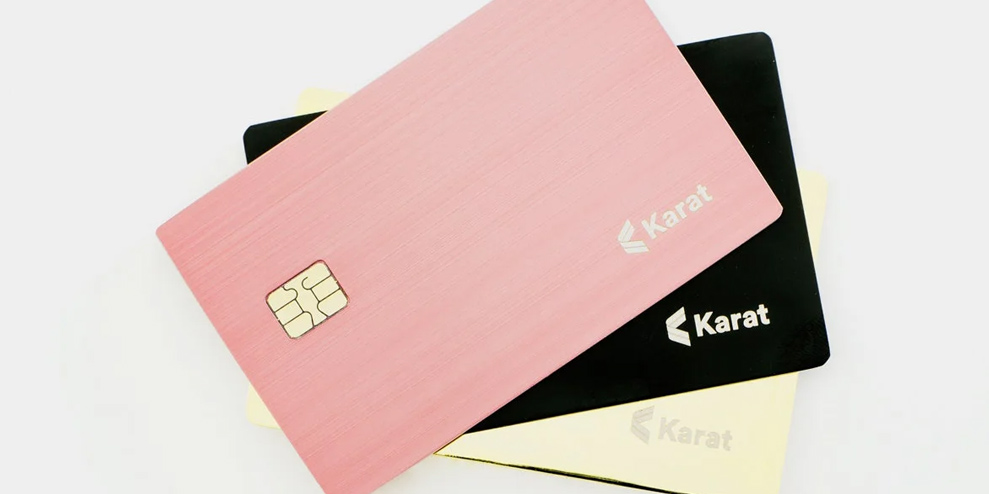Founded by Instagram and finance alums, Karat wants to be the black card in every influencer’s wallet.
SPENCER DONNELLY, WHO goes by TheRussianBadger on YouTube, has cultivated an audience of nearly 2.7 million subscribers for his gaming videos. For years, business has been rosy. YouTube shares a percentage of the ad revenue on each of his videos, and the money is good enough that playing videogames on camera has become a full-time job. A few years ago, he even incorporated The Russian Badger, legitimizing his YouTubing business. The only problem: No bank would give him a serious credit card.
“Imagine that you’re making $2 or $3 million a year and they’re capping you at $20,000 a month,” says Donnelly, which was the best he could get from a traditional bank. When it came time to upgrade his gaming setup—a pricey but necessary expenditure—he found himself buying components in parts and then paying off the card to cycle through his own credit.
Donnelly, like many of the creators who make their living on platforms like YouTube, Instagram, and Twitch, has long felt shunned by institutions that don’t understand that his lifestyle is also his business. That makes him the target market for Karat, a new startup offering financial services to the influencer set.
Before its official launch, Karat piloted the black card with a small group of successful creators like Donnelly, many with similar stories of financial frustration. “We actually have clients who make millions of dollars, and the bank had given them a card with a $10,000 credit limit,” says Eric Wei, Karat’s cofounder. “We’ve met creators who have over $100,000 in a PayPal account—they’re not even using a bank.” A former product manager at Instagram, Wei had been astounded to see how much money some creators were making on the platform. He was even more shocked to see how many of those creators were turned away from financial products like credit cards and mortgages.
The influencer market will be, by some estimates, worth close to $15 billion in just a few years, with hundreds of thousands of people earning sizable income from viral videos and social posts. By Karat’s own count, there are over a million professional full-time creators globally who earn at least $80,000 a year—but many of them have trouble accessing the same resources as someone with a more traditional small business. Part of the difficulty in loaning to influencers is that their business models vary so much. Influencer income can seem, to a bank, unreliable; the money can vary wildly from month to month, and it can come from a variety of different sources, from sponsorship deals and shares of ad revenue to subscriptions and donations from fans. That makes it more difficult for banks to gauge what sort of credit they should offer to an individual creator, and to compare one creator to another. “It’s hilarious seeing traditional institutions work with YouTubers,” Donnelly says. “The easiest way to put it is that everybody thinks you’re a drug dealer.”
To develop Karat’s underwriting capabilities, Wei and Kim had to collect data on how various influencers were making money. In order to apply for the card, creators submit social media metrics and income information. (Karat’s website says it will “prioritize creators with verified followings of at least 100K or those referred by our partners.”) But “it’s not as simple as millions of followers equals millions of dollars,” says Kim. “Social stats are good indicators, but they’re not the full picture.”
Karat advertises that it doesn’t charge user fees or interest. Right now, it makes money from interchange revenue, the fees that merchants pay for each transaction. Longer-term, though, the startup plans to expand into other financial services, becoming a sort of Central Bank of Creators. “Multiple creators have asked us, ‘Can you help me with my mortgage?’” says Wei. “Today, we’re focused on building something where every creator has us in their wallet. But yeah, we want to help them with that.” He adds that basic accounting services were “desperately needed” by many creators, and they have ideas to provide those services at scale.
Wei and Kim aren’t the first founders to see a business opportunity in the gap between traditional institutions and a rising class of new digital entrepreneurs. Brex, the startup that offers charge cards for other startups, got started in 2017, after its cofounders saw how people who couldn’t get business credit were paying for startup expenses on their personal debit cards. Within a year, Brex had reached unicorn status as demand for its cards surged in Silicon Valley.
Karat’s founders hope to do something similar with their card. Like Brex, Karat doesn’t require a personal guarantee. And like Brex, Karat hopes that it can turn its underserved market into a gold mine.
Some accountants have already caught on to the growing market for influencers. Donnelly, for example, pays a monthly fee to a Southern California-based company called Sempahore, which specifically handles financials for YouTubers. “They will do every scrap of paper to run your corporation: meeting minutes, taxes, corporate filings, distribution of profits, payroll, everything,” says Donnelly. Incorporating his business and then farming out the accounting to Semaphore saved him “like half a million in taxes.” More YouTubers would be smart to do the same, he says. But if Karat managed to provide a similar service using software? “That could have huge potential,” he says.
–
This article first appeared in www.wired.com
Seeking to build and grow your brand using the force of consumer insight, strategic foresight, creative disruption and technology prowess? Talk to us at +971 50 6254340 or mail: engage@groupisd.com or visit www.groupisd.com/story





